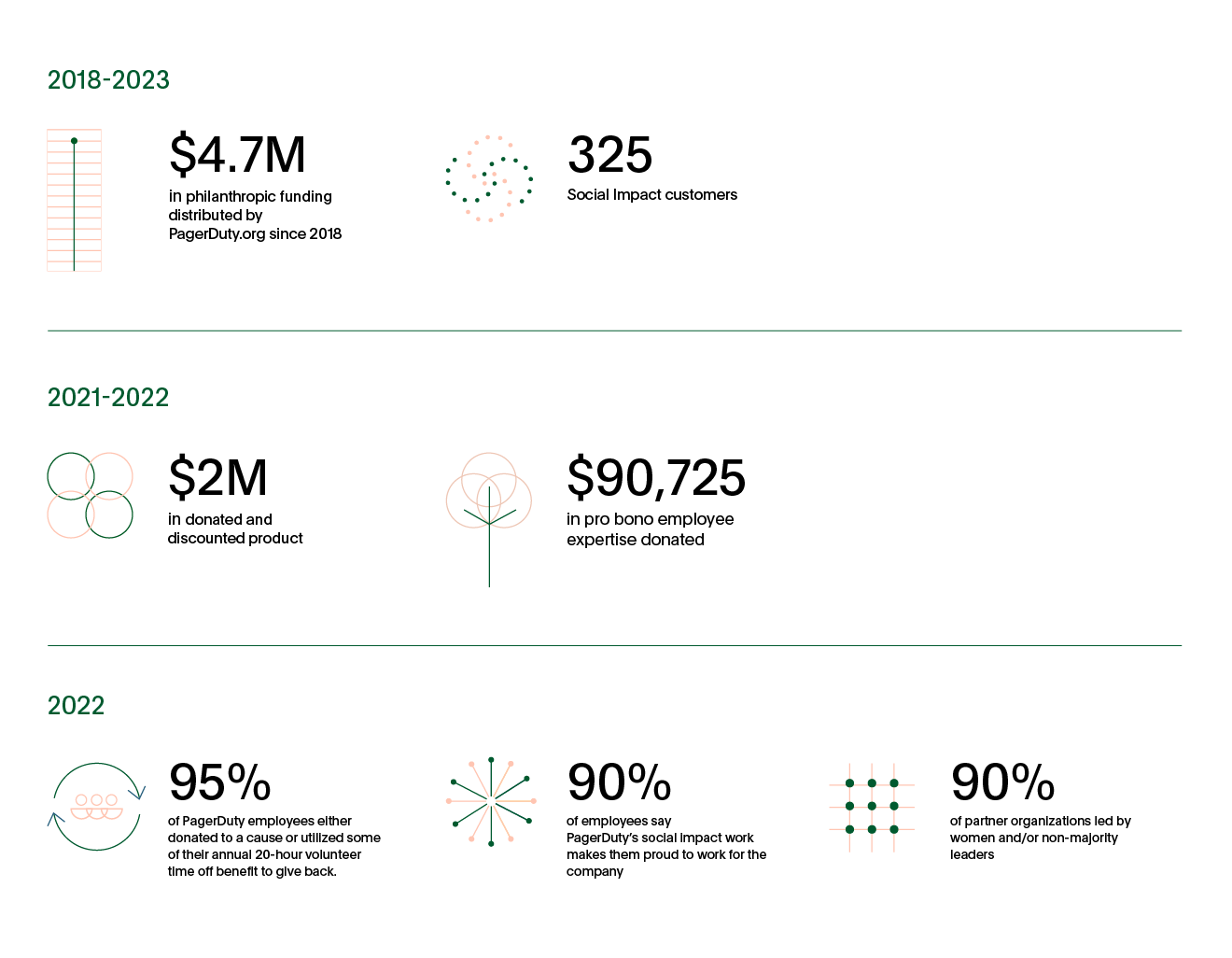Five Years of Social Impact: A Look Back (and Ahead) at Progress Against Our Pledge 1% Commitments
Building a more equitable world by transforming critical work has always been at the heart of PagerDuty’s company vision. Five years into formalizing our social impact work through PagerDuty.org, we continue to operationalize our social impact in alignment with our strategic business goals and innovating in new ways.
Our commitment to both social impact work and our environmental, social, and governance (ESG) outcomes is shared by both the company’s leadership and employees. As we have advanced our ESG programs and investments, laying the groundwork for new commitments and continued progress in the year ahead, this work gives PagerDuty a new avenue to create value for our customers and other stakeholders in pursuit of our shared societal and environmental goals.
In 2017, we committed to Pledge 1%, a corporate philanthropy movement dedicated to making the larger community a key stakeholder in every business. For us, that meant donating 1% of equity, 1% of product, and 1% of employee time to give back.
Our commitment drove the launch of PagerDuty.org five years ago, the company’s social impact arm, which works to empower mission-driven teams to build a more equitable world and sustainable future. PagerDuty.org applies an integrated approach that mobilizes our technology platform, philanthropic investments, people, and voice to amplify the work of social impact organizations. Our early intention was to “empower those working to make a difference in the world and to use our technology to solve intractable challenges,” and through experimentation, iteration, and scaling of our programs, we’ve realized this vision.
We recognize that our company’s commitment to building a more equitable world and sustainable future is a continuous journey. Given the function’s fifth anniversary, we are pausing to reflect on the journey and celebrate some of our key accomplishments over the last five years.
Here are five key things we’ve learned during our first five years:
1) Institutionalize your vision (and impact): Building an equitable world is part of our corporate vision and has been integral to our company’s ethos. That’s why it made sense to make the Pledge 1% commitment early in our journey toward becoming a public company.
2) Invest beyond the money: From the start, we dedicated the internal resourcing and expertise required to make this work successful, such as bringing on a senior-level leader from the beginning, establishing the PagerDuty.org Advisory Board to provide leadership and oversight to support our strategic vision, and establishing our CFO as the executive sponsor for our ESG work.
3) Drive momentum through accountability and transparency: PagerDuty is in the business of operationalizing trust. You see that reflected in our reporting on our social impact outcomes less than two years into the program’s tenure, with the publication of our first ESG disclosures less than three years into the program.
This year, as part of our accountability to our internal and external stakeholders for responsible business practices, we are also refreshing our materiality assessment, defining science-based targets, and laying out a climate action plan.
4) Align the entire business: Leveraging our greatest assets—our people, product, and business practices—is critical to maximizing impact. It’s this holistic framework that enables us to realize our company vision and provide holistic support to community partners and Impact Customers by solving complex social and environmental challenges. By aligning the entire business, we’re positioned to meet the evolving needs of all our stakeholders: our employees, customers, communities, investors, and the planet.
One example of our work to embed social impact across the entire employee lifecycle is our recent analysis with our People team which shows an empirical positive correlation between volunteerism and employee retention and engagement.
5) Invest in social impact work and realize the far-reaching benefits: We spent the first five years building the foundation, experimenting and iterating, staying curious, and gathering relevant data to inform our future investments. We’re building deeper partnerships with our social impact customers and diversifying our philanthropic investments through creative capital mechanisms like mission-related and impact investments. Additionally, we support PagerDuty’s employee acquisition and retention strategy with integrated programs that drive an impact mindset and inspire employees to take action.
Our customers and communities are central to everything we do at PagerDuty. PagerDuty.org’s partnership model mobilizes our product, people, funding, and voice to help nonprofits and mission-driven organizations accelerate their vital work. A few highlights from our partners include:
- We support The Trevor Project in keeping their suicide hotline running 24/7, ensuring fewer interruptions to their suicide-prevention efforts among lesbian, gay, bisexual, transgender, queer, and questioning youth.
- We partnered with SIRUM to prioritize critical work, connecting people with surplus life-saving medications by helping organizations like nursing homes, pharmacies, and manufacturers donate their unused medicine and get it to where it’s needed most.
- PagerDuty’s technology, unrestricted grant funding, and pro bono technical expertise help ensure that Trek Medics International deploys emergency responders in underserved communities around the world.
“As a nonprofit organization, we’re counting our pennies every day and we are dependent on the generosity of others,” said Jason Friesen, Founder and Executive Director at Trek Medics International. “We have to watch our budget very closely. PagerDuty’s holistic support makes it totally possible for us to work at full capacity without having to make any trade-offs or compromise any of our services.”
At PagerDuty, we view addressing our environmental, social, and corporate governance (ESG) risks and opportunities as fundamental to practicing business responsibly and creating value for all stakeholders, and we continue to set meaningful and measurable goals and to integrate ESG activities into our business strategy. We’ve made strong progress in the past five years, and we will continue to hold ourselves accountable to deliver value across our stakeholders as we forge ahead in this next half of our first decade.
